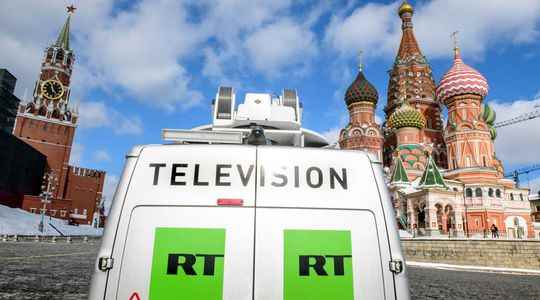Tensions between Russia and Western countries are gaining media attention. Literally. While the context remains tense between the two camps against the backdrop of the Ukrainian crisis – the latter suspecting the first of wanting to invade Ukraine – a new quarrel has been added to the others. At the heart of the tension: the RT channel (Russia Today), financed by the Russian state and considered a propaganda tool for the Kremlin.
“Nein”. The German media regulator announced on Wednesday February 2 the ban on the broadcasting of the RT channel on its soil. “The broadcast of the RT DE television program”, which can still be consulted on the website and a mobile application, was “prohibited” because “the necessary authorization according to media law” was “neither requested nor granted”, according to a statement from the federal agency ZAK. YouTube had already suspended RT’s German language account on its launch day, December 16, over misinformation about the Covid-19 outbreak. Another suspension, a few days later, of the satellite broadcast of the channel, at the request of the German authorities.
RT lamented an “illegal” blocking. “It’s nonsense”, added on Twitter Margarita Simonian, the head of the Russian channel, at the announcement of this new ban. Moscow-based RT has a Serbian license for cable and satellite transmission. Sufficient, according to the channel, to be broadcast in Germany, in accordance with European law. The German regulator ZAK sees it differently: the RT DE being produced by a company whose head office is in Berlin, and targeting “a German public”, the Serbian license is insufficient. So “the broadcast of the program through livestream on the Internet, the mobile application, applications for connected televisions and satellite must stop”, he notes.
The Russian Foreign Ministry promised, as of Wednesday, “retaliatory measures against the German media”. It’s done: he ordered, this Thursday, the closure of the local office of the international radio and television Deutsche Welle, “the withdrawal of accreditation for all employees” and the banning of the channel’s programs in Russia . The authorities have also launched a procedure aimed at recognizing Deutsche Welle as a “foreign agent”, as are already Russian media critics of the power. This is “a first step” from Moscow, which promises an additional response “in good time”. “The measures of the Russian authorities are incomprehensible and excessive”, criticized Peter Limbourg, president of Deutsche Welle. It is “unacceptable”, judged the German Minister of Culture and Media, Claudia Roth.
- Why is this important?
This closure of the Russian branch of Deustche Welle by Moscow is a first for a major Western media in the post-Soviet history of the country, recalls AFP. The Kremlin, if it has tightened the screws of the Russian media since the arrival of Vladimir Putin in power in 2000, avoided attacking the foreign media. This goodwill changed as relations with Western countries grew strained. In 2021, a BBC journalist and a Dutch reporter were expelled from the country.
This tension also puts a spotlight on the Russia Today channel. Launched in 2005 and financed by the Russian State, it has been established in several countries and available in several languages (English, French, Spanish, German, Arabic, etc.). RT is above all seen as a propaganda tool under the orders of Moscow. In the United States, she had to register as a “foreign agent”. Britain has threatened to withdraw its broadcasting license, while Lithuania and Latvia, in particular, have banned it.
Since last November, the movements of Russian troops on the Ukrainian border have revived tensions between the West – including Germany – and the Kremlin. The former accuse the latter of wanting to invade Ukraine and each camp accuses itself of wanting to start a conflict. Western countries have threatened Russia with sanctions in the event of an attack. One of them could concern the Nord Stream 2 gas pipeline linking Oust-Luga (Russia) to the Lubmin terminal (Germany), built but not yet in service.
In addition to this sensitive issue, relations between Germany and Russia have deteriorated in recent years, especially since the poisoning of Russian opponent Alexei Navalny, subsequently treated in Berlin.
